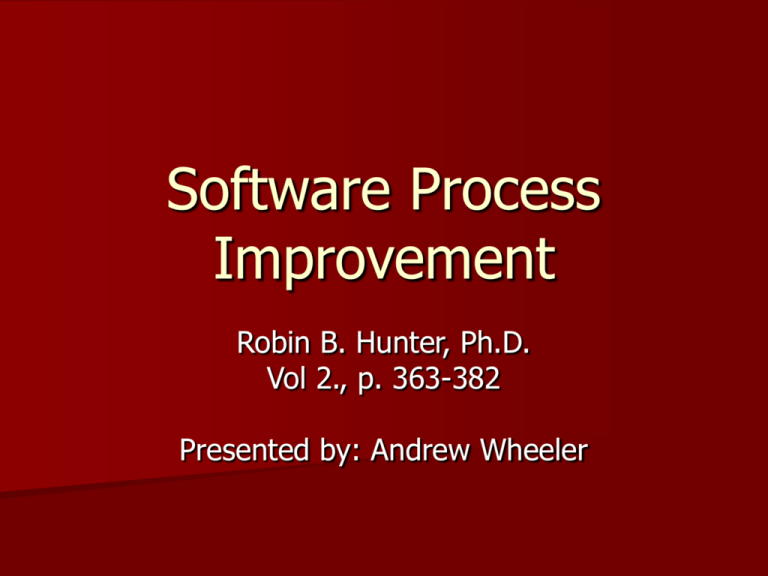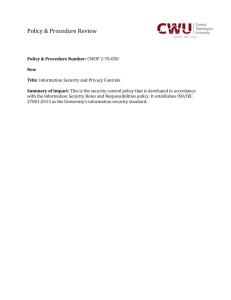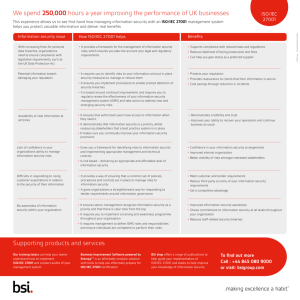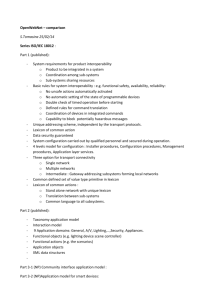Hunter-p363
advertisement

Software Process Improvement Robin B. Hunter, Ph.D. Vol 2., p. 363-382 Presented by: Andrew Wheeler Overview Introduction Background Models for Software Process Improvement Capability Determination Software Process Improvement Standards Conclusions Introduction The quality of the software system is governed by the quality of the process used to develop and maintain it. – Good SE -> Good Development -> Good product Software process is improved via improvement models – SW-CMM and ISO9001 Other standards help with process assessment, capability determination, and process improvement – SPICE, ISO/IEC 15504 and ISO/IEC 12207 Background Software Engineering – Uses structured analysis and design – Object oriented approach – Software measurement as applied science Process and Product approach – Focus on modeling the software development and maintenance – Focus on testing for accuracy and completeness Background (cont) Software Process Assessment – Framework that serves as a roadmap and a gauge Capability determination – Can a company produce a quality product and meet the demands of their customer? Need for process improvement – Control, predictability, and effectiveness all improve Models for Software Process Improvement – SW-CMM 5 Maturity Levels – Initial – …Few processes are defined and success depends on individual effort… – Repeatable - … management process are established to track cost, schedule and functionality…repeat earlier success – Defined – Management and engineering activities well documented… All projects used a tailored version of standard software process for development and maintenance Models for Software Process Improvement – SW-CMM (cont) 5 Maturity Levels – Managed – Measures are put in place… process and products are controlled – Optimizing – Continuous process improvement from quantitative feeback Models for Software Process Improvement – SW-CMM (cont) Maturation – Occurs when key process areas satisfy the goals of the current level – Key Process Area Reqs management, Software project planning, Software subcontract management, etc. – Common Feature Commitment to perform, ability to perform, activities performed, etc. – CF(KPA) -> Key Practice Ability to perform( Software Project tracking and oversight ) > Metrics are collected against cost and effort predictions and reviewed for improvement Models for Software Process Improvement – SW-CMM (cont) Training and assessment teams are available. Software process change – – – – Must start with senior leadership Team effort is a must Continuous Requires investment Benefits – Increased response to change, reduction in project investigation time, accelerated spread of best practices Models for Software Process Improvement – SW-CMM (cont) Spinoffs – BOOTSTRAP Preparation -> Assessment -> Action Plan derivation In line with ISO/IEC 12207 and ISO/IEC 15504 – TRILLIUM Customer focused benchmark – Assessment of supplier’s development process – Internal process improvement – PSP/TSP Personal Software Process - Personal tracking of performance Team Software Process – Team working practices to establish goals, etc. Models for Software Process Improvement – ISO9000 A series of standards and generic practices that can be applied to many fields 1988 (U.K.) – Applying ISO9000 is cost effective (TickIt) – Certificates are awarded to accomplished companies – Certificates have to be renewed ISO90001 applies to software development Rule of thumb – An ISO9001 compliant organization would relate to a SW-CMM level 2 to 3 Models for Software Process Improvement – SPICE International standardization – Being pilot tested in U.S. Promotion of SPICE approach Identify weaknesses in model and documentation – Standardization via technical reports Items -> Drafts -> Standards Capability Determination Systematic assessment and analysis of select software processes to reveal strengths, weaknesses, and risks associated with deploying process to satisfy requirements Related to procurement Birth of SA-CMM Software Process Improvement 8 steps – Examine needs – Initiate – Conduct assessment – Analyze results and form action plan – Improve – Confirm – Sustain – Monitor Software Process Improvement (cont) Benefits – Qualitative Increased staff morale Increased customer satisfaction via product quality and productivity – Quantitative Hard to measure Relationship to qualitative – Higher morale -> less staff turnovers -> less training costs Standards ISO/IEC 12207 – Focus on lifecycle objectives, recording data and additions to lifecycle practices – Main processes Primary – Acquisition, supply, etc. Supporting – Documentation, configuration management, etc. Organization – Management, improvement, training Standards (cont) ISO/IEC 15504 – Processes are identical and split into 5 categories Primary process relates to customer supplier and engineer categories Supporting process relates to support categories Organizational relates to management and organization categories – Continuous model – Possible rearchitecting of ISO 12207 and 15504 to be more compatible with each other may result from hearings Conclusions SW-CMM and ISO9001 – Both are designed for capability determination as well as process improvement Many other standards exist to help guide companies to improve process – ISO 15504 and SPICE Benefits from abiding by these standards are still in qualitative form but are leading to quantitative form My thoughts Very well structured All concepts presented are pretty modern One major issue – How much feedback is truly given from the implementers of the quality process Streamlining the process would drastically improve usability


